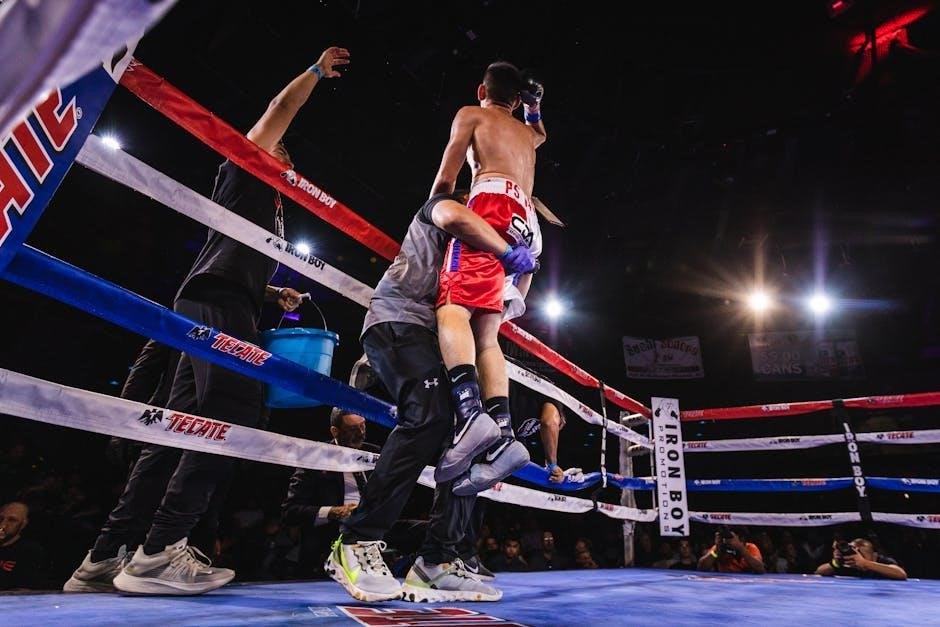The Man in the Arena Poem: An Overview
Theodore Roosevelt’s “Man in the Arena,” part of his “Citizenship in a Republic” speech, emphasizes valiant effort over criticism. Its enduring message champions those who dare to strive, even amidst dust, sweat, and potential failure, inspiring courage.
The Historical Context of the Speech
Delivered in Paris at the Sorbonne on April 23, 1910, Theodore Roosevelt’s “Citizenship in a Republic,” including “The Man in the Arena,” reflected his post-presidency world tour and engagement with global affairs. As a former president (1901-1909), his perspective on leadership had been deeply shaped by his experiences as a statesman, soldier, explorer, and reformer. The speech aimed to address the responsibilities of citizens in a republic, particularly in an era of increasing complexity and global interconnectedness.
Roosevelt’s words resonated with the progressive spirit of the time, emphasizing action, courage, and civic engagement. His message contrasted with the cynicism and detachment he perceived in some intellectual circles. He sought to inspire individuals to actively participate in shaping their societies, rather than merely criticizing from the sidelines. “The Man in the Arena” encapsulates this call to action, celebrating those who dare to enter the arena of life and strive valiantly, despite the risk of failure.
The Central Theme: Courage and Action
“The Man in the Arena” champions courage and action, urging individuals to engage actively in life; It emphasizes the value of striving valiantly, even when faced with the inevitability of errors and shortcomings.
The Critic vs. The Doer
Roosevelt sharply contrasts the critic and the doer. The critic, detached and observant, points out flaws and stumbles from a safe distance. They analyze and judge, offering commentary without personal risk or investment. The doer, conversely, is “in the arena,” actively engaged in the struggle. They face challenges head-on, bearing the marks of their efforts – “dust and sweat and blood.”
The doer may err and fall short, but their striving is valued above the critic’s detached judgment. Roosevelt emphasizes that credit belongs to those who dare to act, even imperfectly, rather than those who merely critique from the sidelines. The doer experiences “great enthusiasms” and “great devotions,” dedicating themselves to a worthy cause, a stark contrast to the critic’s cynicism.

Analysis of Key Phrases
Key phrases in Roosevelt’s speech vividly portray the arena’s reality. These powerful words underscore the dedication, sacrifice, and vulnerability inherent in pursuing meaningful endeavors, highlighting the contrast with the critic’s detached perspective.
“Dust and Sweat and Blood” Interpretation
The phrase “dust and sweat and blood” is central to understanding the core message of Roosevelt’s “Man in the Arena.” These words are not merely descriptive; they are powerfully symbolic, evoking the tangible reality of struggle, effort, and sacrifice. “Dust” represents the grime of the arena, the imperfections and setbacks encountered along the way.
“Sweat” symbolizes the hard work, dedication, and relentless effort required to pursue a worthy cause. It is the physical manifestation of commitment. “Blood,” perhaps the most evocative, signifies the potential for pain, both physical and emotional, that comes with daring to venture into the arena;
Together, these elements form a potent image of authentic engagement. It speaks to the willingness to risk everything. The phrase emphasizes that true achievement is not born of sterile perfection, but from embracing the messiness of real-world action. It is a badge of honor earned through genuine endeavor.

The Poem’s Relevance Today
Roosevelt’s words resonate powerfully today. In a world often dominated by criticism, the poem reminds us of the value of courage, action, and resilience, encouraging individuals to embrace challenges and strive valiantly.
Application in Personal Development
The “Man in the Arena” offers a powerful framework for personal development. It encourages individuals to shift focus from the fear of failure to the importance of striving towards worthy goals. By embracing vulnerability and accepting that mistakes are inevitable, individuals can cultivate resilience and a growth mindset.
The poem promotes self-compassion, understanding that personal growth involves “dust and sweat and blood.” It inspires individuals to actively participate in their lives, rather than passively observing from the sidelines. By focusing on the effort and dedication put forth, rather than solely on the outcome, the poem fosters a sense of purpose and fulfillment. It encourages embracing challenges and striving valiantly, regardless of external criticism or potential setbacks. Ultimately, it’s about showing character.
The Poem’s Popularity and Influence
The poem’s impact stems from its powerful message of courage and resilience. It resonates across various fields, inspiring individuals to embrace challenges and strive valiantly, making it widely quoted and referenced.
Use in Brene Brown’s Work
Brené Brown, a renowned researcher and author, prominently features Theodore Roosevelt’s “Man in the Arena” in her work, particularly in books like “Daring Greatly” and “Daring to Lead.” She uses the quote to illustrate the importance of vulnerability and courage in leadership and personal growth.
Brown emphasizes that true courage involves stepping into the arena, risking failure, and facing criticism, rather than remaining on the sidelines as a detached observer. The “Man in the Arena” quote encapsulates Brown’s core message about embracing vulnerability and wholeheartedly engaging in life, despite the potential for setbacks and judgment.
By referencing Roosevelt’s words, Brown underscores the significance of choosing action over apathy and valuing the effort and dedication of those who dare to strive, regardless of the outcome. The poem inspires readers to cultivate resilience and embrace their imperfections.

Finding the Poem in PDF Format
Obtain “The Man in the Arena” in PDF format through online searches, educational websites, or archives. Many sites offer downloadable versions of Theodore Roosevelt’s speech for easy access and offline reading convenience.
Where to Download the Text
Finding a PDF of Theodore Roosevelt’s “The Man in the Arena” speech is relatively straightforward, thanks to its widespread recognition and public domain status. Several reputable online resources offer downloadable versions. Websites dedicated to historical documents, such as those maintained by universities or archives, are excellent starting points.
Project Gutenberg, a renowned source for free ebooks, may also host the complete text of “Citizenship in a Republic,” which includes the famous excerpt. Additionally, many educational websites and online libraries provide PDFs for students and researchers. Simply searching for “The Man in the Arena PDF” on a search engine will yield numerous results, but it’s essential to ensure the source is credible to avoid inaccurate transcriptions or altered versions.
Consider checking government websites or online collections of presidential speeches for official versions of the document. When downloading, always be mindful of potential security risks and scan the file with antivirus software.

The Lasting Legacy of Theodore Roosevelt’s Words
Theodore Roosevelt’s “Man in the Arena” remains powerfully relevant, its legacy cemented in its timeless message of courage, resilience, and the importance of striving despite the inevitability of setbacks. The speech resonates across generations, inspiring individuals to embrace challenges and value action over passive criticism. Its influence extends beyond political circles, finding application in personal development, leadership training, and even popular culture.
The poem’s themes of vulnerability, daring greatly, and embracing imperfection have been embraced by thought leaders like Brené Brown, who uses it to frame discussions about shame and courage. The “Man in the Arena” serves as a reminder that true worth lies not in flawless execution but in the willingness to step into the arena, face adversity, and contribute meaningfully, even when the outcome is uncertain. It encourages a spirit of engagement and active citizenship, urging individuals to be participants rather than mere spectators in the game of life.
Comments